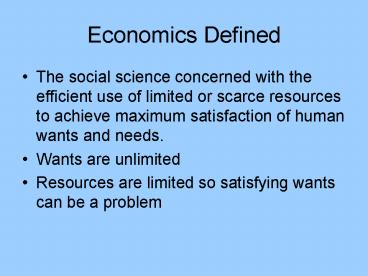Economics Defined - PowerPoint PPT Presentation
1 / 18
Title:
Economics Defined
Description:
Marginalism cont. This applies to individuals, firms, and government. The principle is the same. If the marginal cost of an action or decision exceeds the marginal ... – PowerPoint PPT presentation
Number of Views:40
Avg rating:3.0/5.0
Title: Economics Defined
1
Economics Defined
- The social science concerned with the efficient
use of limited or scarce resources to achieve
maximum satisfaction of human wants and needs. - Wants are unlimited
- Resources are limited so satisfying wants can be
a problem
2
Perspectives in Economics
- Scarcity and choice
- Resources can only be used for one purpose at a
time - Scarcity thus requires that choices must be made
- The cost of any good, service, or activity is the
value of what must be given up to get it. This
is opportunity cost. This is a most important
concept which we will refer to over and over.
3
Rational Behavior
- Rational self interest means you make decisions
to achieve the maximum fulfillment of your goals - Different preferences (personal wants and needs)
and circumstance lead to different choices for
individuals - Rational self interest is not to be equated with
selfishness although an argument could be made to
do so. (Also known as the invisible hand)
4
Marginalism How much wood..
- In economics marginalism refers to extra. If you
talk about marginal benefit or marginal cost your
are talking about extra or added to the original. - Most decisions concern a change in current
conditions so the focus of choice is based on
marginal analysis or is the benefit of the choice
greater than the cost of the choice. This is true
for each additional choice involved with this
decision.
5
Marginalism
- Economics uses certain short cuts to refer to
marginalism - MB marginal benefit. That is the added benefit
one receives for making or doing a particular
thing. - MC marginal cost. That is the added cost one
receives for making or doing a particular thing.
6
Marginalism cont.
- This applies to individuals, firms, and
government. The principle is the same. - If the marginal cost of an action or decision
exceeds the marginal benefit then it should not
be done or chosen. - TINSTAAFL-this is no such thing as a free lunch.
Learn this acronym!!!!!! - Lets look at this to see if it is true.
7
Why should I study economics? This is a good
question.
- Most political issues have economic aspects or
consequences - If you understand economics you can make a more
informed political decision - Economics can help you make better personal
decisions as well. - Economics is not finance and is not going to
teach you how to get rich quickly or otherwise.
8
Methodology of the Science of Economics
- Observation
- Formulation of explanations for the cause and
effect relationships(hypotheses) - Testing hypotheses
- Accepting, rejecting, or modifying the hypotheses
9
continued
- Many economic principles are embodied in
- Theories
- Laws
- Models
- You can usually tell who has studied economics
too long because they have a law named after
them.
10
Ceteris Paribus
- This assumption is all important when working
with assumptions and information in economics.
Essentially, what it means is all other things
being equal or we are going to keep all factors
the same except one which we are going to change
and see what happens. - In most circumstances only ONE condition is
changed at a time allowing us to look at its
effect. If asked for then another condition would
change and we would do the same thing.
11
Theoretical versus Policy
- Theory economics is intellectual and academic. It
is used to test abstractions and connections of
hypotheses, models, usually in the most simple
way. In this economics models scientific
experiment.
12
Policy Economics
- Policy economics uses economic facts and
principles to resolve specific problems and
achieve certain goals in a specific economic
function.
13
Formulating Policy
- State goals for policy
- Recognize options that may be used to achieve
goals - Evaluate the options on the basis of criteria
specific and important to those who are in power.
(decision makers)
14
Economic Goals common to Western Capitalist
Democracies
- Economic growth
- Full Employment (low unemployment)
- Economic Efficiency
- Price Level Stability (low inflation)
- Economic Freedom
- Equitable Distribution of Income
- Economic Security
- Economic Justice
15
Issues with goals
- Some are contradictory
- Some are complementary
- Some are wishes and unfulfillable
- Not all goals can be attained at the same time or
with the scarce resources we have so choices must
be made
16
There are two schools of economics
- Macroeconomics is the study of the economy as a
whole by looking at large segments known as
aggregates such as GDP, unemployment, inflation,
etc. - Microeconomics is the study of specific economic
units such as households, firms, and specific
markets and products
17
Positive and normative
- Positive economics describes the economy as it
actually is, avoids value judgment and bias, and
attempts to establish scientific statements about
economic behavior. - Normative economics involves value judgments and
bias in which the economy is seen as it SHOULD be
according to the perspective of that person and
what needs to be done to get it to that point.
Most political economic statements are normative.
18
Pitfalls for economic students
- Bias and preconceptions should be limited
- Loaded terminology enhances bias and should be
used as little as possible. - Not knowing the correct economic language to use.
Terms are important and should be learned as
appropriate. - Fallacies Post Hoc Fallacy and Correlation
versus Causation. I will give examples.































